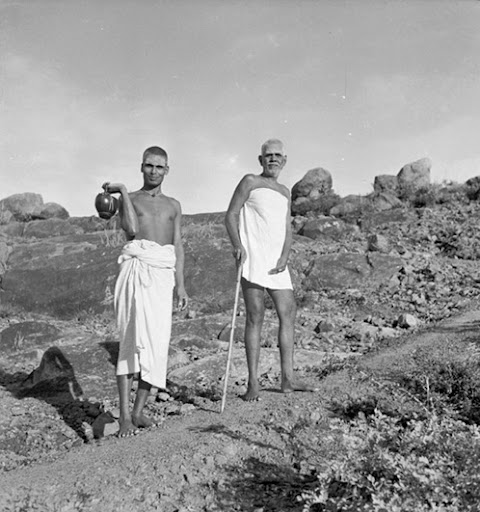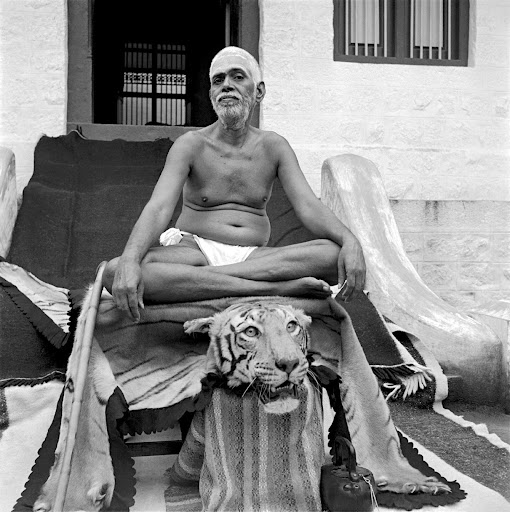Prev Next
3rd July, 1947
A devotee, who has been coming to the Ashram off and on, yesterday, during conversation regarding Bhagavan’s stay on the hill, asked him, “While Bhagavan was on the hill, it seems some one did abhisekham to Bhagavan with coconut water. Is that a fact?”
Laughingly Bhagavan said, “Yes, while I was in Virupaksha Cave, some ladies from the north came. I was sitting on a platform under the tamarind tree with half-closed eyes, without particularly noticing their arrival. I thought they would go away after a while. Suddenly there was a noise of breaking something. I therefore opened my eyes and saw coconut water trickling down my head. One of those ladies had done that abhisekam. What was I to do? I was in mouna and couldn’t talk. I had no towel even to wipe the water off, and so the water dried on my body as it was.
Not only that. There used to be lighting of camphor, pouring of water on the head, thirthas (sacred waters), prasadas, and several such troublesome performances. It used to be quite a job stopping such things.”
I myself have seen similar instances some four or five years back. In the room where Bhagavan takes his bath, there is a hole through which the water that is used drains out.
Below that, a gutter was constructed to drain off the water.
At the time of his bathing, some devotees used to gather at that place, sprinkle on their heads the water that came out of the room, wipe their eyes and even use it for achamaniyam (sipping drops of water for religious purposes). That was going on quietly and unobserved for some time. But in due course people began bringing vessels and buckets to gather that water and soon there was a regular queue. That naturally resulted in some noise which reached Bhagavan’s ears. He enquired and found out the facts. Addressing the attendants, he said,
“Oh! Is that the matter? When I heard the noise I thought it was something else. What nonsense! Will you get this stopped or shall I bathe at the tap outside? If that is done, you will be saved the trouble of heating water for me, and there will be no trouble for them either, to watch and wait for that tirtha. What do I want? Only two things, a towel and a koupinam. I can bathe and then rinse them at the tap and that completes the job. If not the tap, you have the hill streams and the tanks. Why this bother? What do you say?”
When Bhagavan thus took them to task, they told everything to Sarvadhikari who thereupon put a ban on any one going to the side of the bath room during the bathing hour.
Another thing happened during those days. Bhagavan used to go to the hill in the hot sun after taking meals in the forenoon. On his return, when he came to the platform near the hall, the attendants used to pour water on his feet from the kamandalu (wooden bowl) and he used to wash his feet and then go in. Some used to hide somewhere there and, as soon as he went into the hall, they used to collect that water and sprinkle it on their heads. Once an enquiry starts, all faults come to light, don’t they? Bhagavan appears to have noticed that also. One afternoon he saw through the window an old and long standing devotee sprinkling this water on his head. Seizing that opportunity, he began saying,
“There it is! See that! As I have not been taking any special notice of it, it is going beyond all limits. However long they are here and however often they hear what I say, these ridiculous things do not stop. What is it they are doing? I shall henceforth stop washing my feet, do you understand?”
He thus reprimanded them severely. That devotee was stunned, and with shame and grief, went to Bhagavan immediately and begged to be excused.
Not only did Bhagavan admonish him like that, but from the next day onwards, Bhagavan refused to wash his feet there even though the attendants pleaded with him to retain the existing custom. As I was then in the town, I did not know about this immediately. Four days later, somebody arranged bhiksha in the Ashram and invited me for meals.
After meals I stayed there. Bhagavan as usual came down the hill. As I had some doubts about my sadhana, I thought I could ask him leisurely after he returned to the hall and so, I stood at the western window outside the hall. It is usual for me to do so whenever I wanted to ask Bhagavan and clear my doubts. You know what happened this time? Instead of facing east, as usual, Bhagavan turned towards the side where I was standing. I stepped aside and gave way with some misgivings. He looked at me with concealed anger. I trembled with fear. I did not know why he looked at me like that. As he was turning the corner by the window, the attendants tried to give him water to wash his feet.
Bhagavan shouted at them, saying, “No.” When they said, “You have been in the hot sun,” he said. “What of that? If we look to cleanliness, a number of people wait for that water. Enough of this. If you want, you wash your feet.” So saying, Bhagavan entered the hall.
I was wondering if I had committed any fault resulting in Bhagavan getting angry and so went away, without trying to clear my doubts. In the evening, I enquired and learnt all that had happened before. It was only after that, I had some peace of mind.


